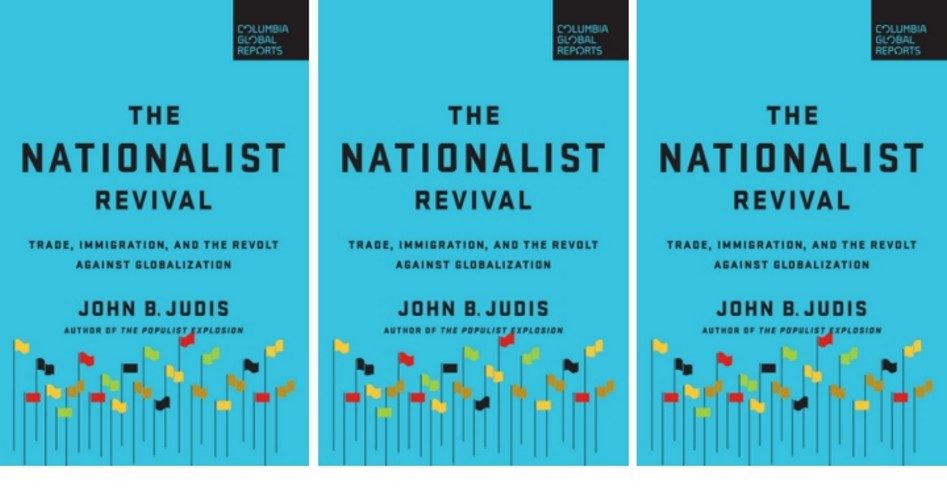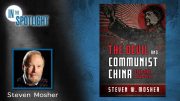
In a review for The New American of John Judis’s previous book, The Populist Explosion, this reviewer observed that Judis, although writing from a Left-wing perspective, had a clear understanding of the Populist movement that brought Donald Trump to the presidency. His insights into the Populist movement in the United States and Europe remain one of the most clear-sighted analyses from that perspective.
In his latest book, The Nationalist Revival, Judis offers a similarly helpful evaluation of the resurgence of Nationalism in the Western world. Again, Judis eschews the cliched anti-Nationalist tropes which are so common on the Left, openly mocking the assertion by the New York Times that “national identity is a myth,” contending instead that:
national identity is not just a product of where a person is born or emigrated to, but of deeply held sentiments that are usually acquired during childhood. Nationalism is not simply a political ideology, or set of ideas, but a social psychology. Nationalist sentiment is an essential ingredient of a democracy, which is based on the assumptions of a common identity, and of a welfare state, which is based on the acceptance by citizens of their financial responsibility for people whom they may not know at all, and who may have widely different backgrounds from theirs.
Judis is quite aware that the current Progressive linkage of unrestricted immigration with limitless expansion of the social welfare state is incoherent; rather, he maintains, the public only tolerates or supports the welfare state because of a sense of shared identity with the recipients of such public support:
Nationalist sentiment underlies the acceptance or rejection of the welfare state. The modern welfare state has been built upon shared nationalist sentiments. Governments had to secure citizens’ commitment to pay taxes to help their fellow citizens when they became sick or disabled, too old to work, or lost their job and couldn’t quickly find another one…. This willingness to identify with others assumed that their fellow citizens who received this aid conformed to certain cultural norms: that, for instance, they were or had been willing to work; that if they were immigrants, that they had entered the country legally and were committed to staying and working and that in extreme circumstance, they would fight to defend the nation.
Judis highlights a profound division within the ideological ranks of the modern American Left between “self-identified liberals … [who] might have actually agreed with Trump voters on some economic issues” and Internationalists (whom he calls “cosmopolitans”): “When Trump supporters identify as liberals they are really a distinct segment of those voters who might identify themselves in that manner…. The relevant polarity is not really between nationalists and liberals, but between nationalists and cosmopolitans.” Judis makes it clear that he identifies with the liberal nationalists; he recounts an encounter on a book tour: “A member of the audience reproached me: ‘I don’t understand why you are criticizing free trade,’ she said. ‘It has raised the standard of living of many people around the world.’ Before I could measure my words, I replied: ‘I don’t give a damn about people around the world.’”
In Judis’s assessment, the “cosmopolitans” are radically alienated from nationalists, beginning with their presidential choice in the last election: “Clinton was in her way as polarized in her outlook as Trump was. They represented starkly different and incompatible visions of America.” Judis recognizes that the active efforts of the “cosmopolitans” to reshape the world according to their ideological goals have been deaf to the actual desires of the citizens of the countries they endeavor to reshape: “But in attempting to create this new world order, the U.S., and to differing degrees, its Western European allies, were oblivious to the nationalist sentiments in the countries they were trying to bring into this community.”
Judis recognizes that the “cosmopolitan” worldview unites many on the purported Right and Left in a way that inherently alienates nationalists who are otherwise divided on many policy issues:
George W. Bush and his war council made the decision to invade, but the seeds of it were sown in the debate in the 1990s about American intervention first in Somalia and then in the former Yugoslavia. This debate pitted post-Vietnam liberals and neo-conservatives against realists. The liberals and neo-conservatives believed that in order to spread free market democracy, the United States could and should remake other nations. In intellectual circles, this stance was embraced by the editorial policies of the liberal New Republic and the newly minted neo-conservative Weekly Standard.
In short, while conservatives will find many points of disagreement with Judis’s general worldview, he offers an extremely helpful evaluation of the current divisions that are tearing the Europe Union apart, and that have led to so many irresolvable conflicts in Washington, D.C.
The Nationalist Revival — Trade, Immigration, and the Revolt Against Globalization, by John B. Judis, New York: Columbia Global Reports, 2018, 157 pages, paperback.



